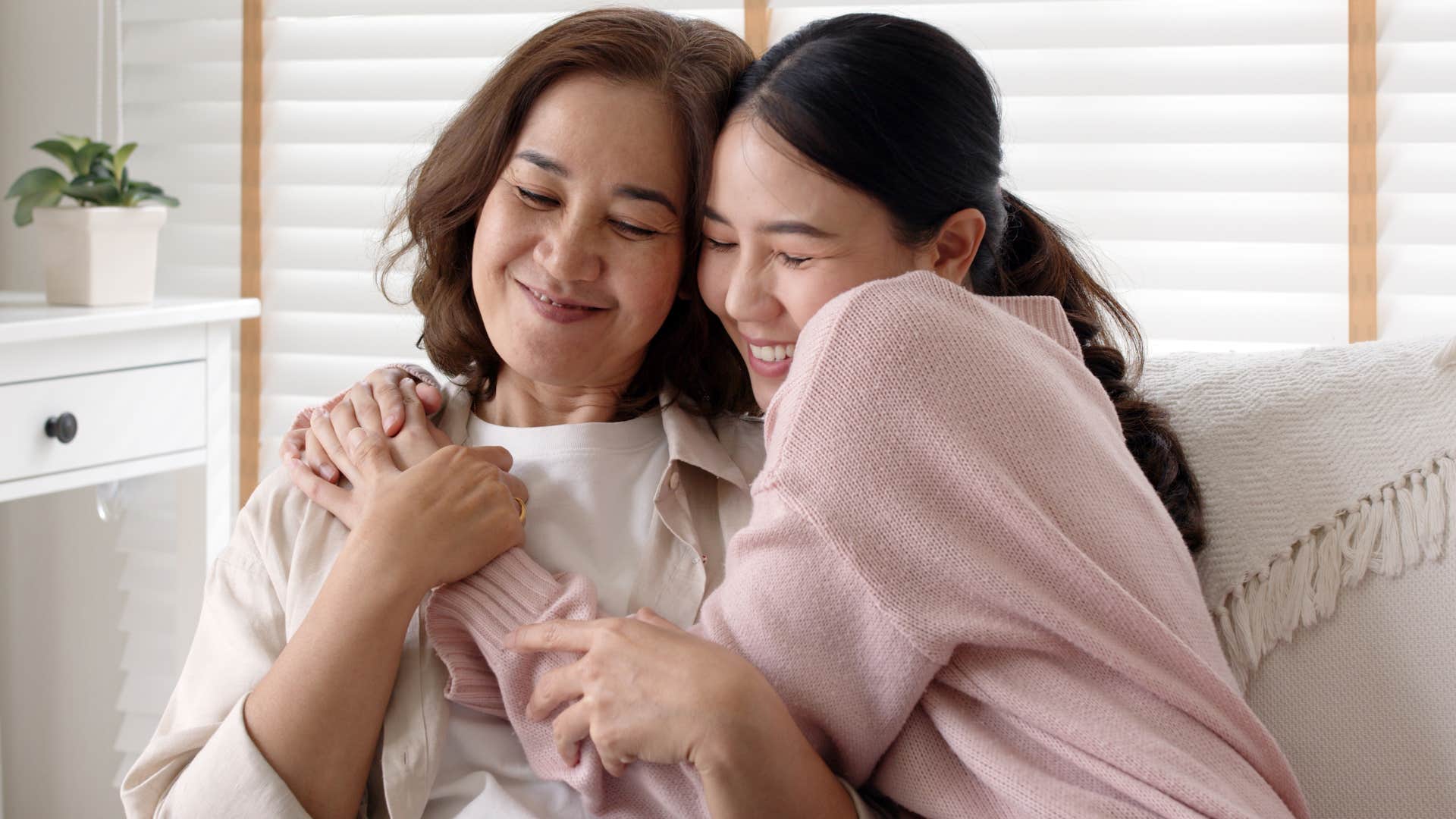10 Traits Of Parents Whose Adult Kids Still Adore Them Once They Grow Up
Maintaining a healthy relationship with your adult children isn't easy, but it's worth the effort.
 Drazen Zigic | Shutterstock
Drazen Zigic | Shutterstock Navigating adulthood as an adult child is difficult enough without unresolved childhood trauma or a tumultuous relationship with a parent. But for people with great relationships with their parents, it's often slightly more bearable. Healthy parents who emotionally support their adult children — providing a safe space for connection and an honest perspective on life — can genuinely help to shape their children's well-being, relationships, and lifestyle in impactful ways.
Of course, there are certain traits of parents whose adult kids still adore them once they grow up that not everyone has. However, if you're a parent who wasn't able to embody these traits in your kids' adolescence, it's never too late to make a commitment to them now. Finding a great balance and a healthy relationship with your kids starts with a step forward.
Here are 10 traits of parents whose adult kids still adore them once they grow up
1. They're open-minded
 Chay_Tee | Shutterstock.com
Chay_Tee | Shutterstock.com
The art of communicating effectively with an adult child revolves around ensuring everyone feels heard and understood. According to the Newport Institute, "Rather than judge your adult children or try to solve all their problems, validate their feelings instead. Let them know you've heard them. Empathize with where they're coming from. Paraphrase what they've said so they feel understood. When you validate their feelings and experiences, you open the door for more upfront communication."
Parents who validate their children's emotions and opinions, even if they don't agree, often have the healthiest and most loving relationships. Each party feels comfortable with open communication, even if it's in the pursuit of understanding or common ground.
Find ways to accept your adult children, even amid their flaws or struggles, if you're looking to evolve into a healthy relationship. It won't be easy, but starting somewhere, even amid adulthood, is the right step forward.
2. They're empathetic
 Lightfield Studios | Shutterstock.com
Lightfield Studios | Shutterstock.com
Psychologist Dr. Maika Steinborn argues that expressing empathy to your children evolves as they enter adulthood. There's no "perfect" way to show up for children, in general, but there are appropriate ways for parents to support their adult children depending on what kind of help they need from you.
Considering more young adults today are recognizing the link between their childhoods and challenges into adulthood — from relationship struggles, to attachment styles, and emotional needs — it's important for healthy parents to learn how to take accountability, listen, and lead with compassion.
Sometimes, that means listening without judgment. Other times, it's supporting adult children's intense emotions, even when they're directed at a parent, and even when they don't necessarily agree with what they're arguing.
3. They listen more than they talk
 Fizkes | Shutterstock.com
Fizkes | Shutterstock.com
Unprompted advice often sparks resentful feelings in a parent-child relationship, especially when it happens frequently in adult conversations and interactions. Many adult children go to their parents for emotional support, not solutions, so when they're met with unsolicited advice to their struggles, they feel equally dismissed and invalidated.
Parents whose adult kids still adore them once they grow up do more listening than talking when their kids vent to them, whether it's about a work qualm, relationships struggle, or emotional issue. They cultivate a safe space for their kids to express their emotions without judgment and, of course, only add their own advice and solution-oriented feedback when they're openly asked for it.
4. They respect boundaries
 Fizkes | Shutterstock.com
Fizkes | Shutterstock.com
Author Anne Catherine, in her book "Boundaries: Where You End and I Begin," argues that healthy familial boundaries can feel uncomfortable to craft and protect if you grew up in an unstable home or with toxic parents. However, healthy parents make this practice a reality in their households, encouraging their kids to communicate on their own and ensuring they respect others.
Parents who advocate for their children's boundaries throughout their lives, whether it's knocking on the bedroom door or asking for advice, instill this practice in their kids, setting their future adult relationships up for success. When children feel respected by their parents, they're not afraid to relay a similar understanding back, even once they grow up and enter into their own personal lives.
5. They're trustworthy and honest
 Dragana Gordic | Shutterstock.com
Dragana Gordic | Shutterstock.com
Being able to trust a parent is similar to any other relationship: it's necessary and essential. If you can't count on your parents to listen without judgment, keep your secrets, or trust them to respect your boundaries, you don't have a healthy relationship.
Becoming a parent that your adult child trusts doesn't happen overnight; in fact, it often starts early in their childhood with respectful boundaries and honest communication. According to a study published by the Journal of Adolescence, knowing your children — from their beliefs, to their preferences and goals — is the foundation for a relationship built on trust. The traits of parents whose adult kids still adore them once they grow up is founded on this trust. They've found a safe space to express their emotions, be vulnerable, and seek advice from their parents, even into adulthood.
6. They're confident and self-assured
 PeopleImages.com - Yuri A | Shutterstock.com
PeopleImages.com - Yuri A | Shutterstock.com
Studies, like one published by the Journal of Personality and Social Psychology, argue that an adult child's self-esteem and confidence is largely founded on their childhood. Their parents' ability to celebrate authenticity, while also speaking highly of themselves and protecting their own self-esteem, is what gives kids the freedom to cultivate their own individuality.
Into adulthood, these adult children have a more balanced sense of self, protecting their relationships from being plagued by insecurity and opening the door to more genuine connection. As long as their parents continue to feed into their self-assuring habits and practices alongside their adult children, they tend to harbor a healthier relationship than those who don't.
7. They're open to change
 PeopleImages.com - Yuri A | Shutterstock.com
PeopleImages.com - Yuri A | Shutterstock.com
Clinical psychologist Diana Hill argues that being a psychologically flexible parent is just as important as being enthusiastic about physical changes like a new job or lifestyle. By leading with empathy, finding ways to support your children, and pouring into your own emotional health, you can be a psychologically flexible parent. But without an aura of acceptance and a welcoming nature, your kids won't find their safe space with you.
Even into a child's adulthood, this safe space is important in a parent-child relationship, even if it's not necessarily solely relied upon like it was during their adolescent years.
8. They're emotionally intelligent
 PeopleImages.com - Yuri A | Shutterstock.com
PeopleImages.com - Yuri A | Shutterstock.com
Empathy and emotional intelligence are two sides of the same coin. Can you support other people and lead with compassion? Can you acknowledge and regulate your own emotions with grace? Healthily supporting other people without a basis of internal emotional intelligence is nearly impossible, especially for parents and their adult children.
That's exactly why prioritizing emotional intelligence is one of the most important traits of parents whose adult kids still adore them once they grow up. They don't look to their kids for reassurance, validation, or an overwhelming sense of support, just for love, quality time, and communication.
9. They're funny and use humor intelligently
 PeopleImages.com - Yuri A | Shutterstock.com
PeopleImages.com - Yuri A | Shutterstock.com
Family therapist Amy Smith argues that there are plenty of communication styles, techniques, and subtle tips that can help to support parent-child relationships, even into adulthood, but the beauty of playfulness is often overlooked. When parents can both introduce humor into uncomfortable conversations and ensure their kids feel comfortable expressing their struggles, they cultivate a safe space that's easy for everyone to tap into.
According to a 2024 PLOS One study, parents who utilize humor in their relationships with their children often cultivate healthier connections and communication skills, even into adulthood.
10. They're reliable and consistent
 Fizkes | Shutterstock.com
Fizkes | Shutterstock.com
A study published in the journal Cureus revealed that children who grow up with reliable and emotionally consistent parents have lower rates of depression than their counterparts. Even into adulthood, the effects of this support continue to prove impactful for maintaining healthy relationships between parents and their kids, and beyond.
Without the insecure attachment styles and anxiety of an unreliable parent plaguing adult children, they have more space for harboring open communication, trust, and unconditional love. Not only does this security ensure they have a safe space for each other, it gives adult children the foundation to grow other personal relationships with future partners, friends, and colleagues.
Zayda Slabbekoorn is a staff writer with a bachelor's degree in social relations & policy and gender studies who focuses on psychology, relationships, self-help, and human interest stories.

